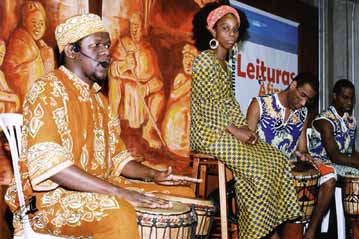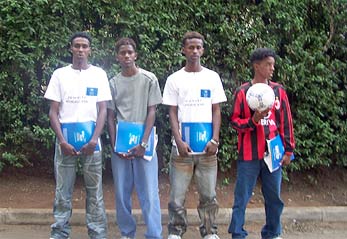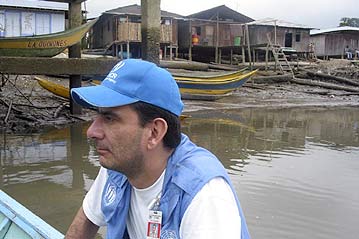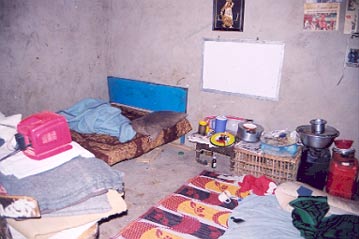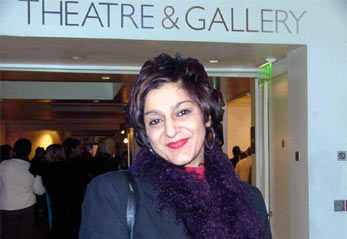Refugees in South Africa: Great Expectations vs. Great Frustrations
Refugees in South Africa: Great Expectations vs. Great Frustrations
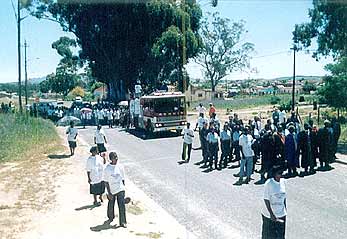
MBEKWENI, South Africa (UNHCR) - At first glance, Mbekweni - a remote township of 70,000 people in the heart of the wine-producing Paarl Valley about 100 km from Cape Town - seems like an intoxicating place to live. But for the 350 refugees settled in Mbkeweni, which means "place of respect" in the local Xhosa language, life is no bed of roses.
Like their counterparts in other parts of South Africa, the refugees in Mbekweni had come to the "golden land" with great expectations of a better life, but have found nothing but great frustrations at a lack of social support in the country.
South Africa hosts 23,000 recognised refugees, many of whom arrived via several asylum or transit countries. They came expecting to improve their lives drastically, but are disappointed when they fail to find jobs or access social services. Doctors, engineers and teachers have had to settle for menial jobs. While their children's access to primary school has improved, it is much harder at the secondary and tertiary levels. This year, 220 refugees applied for 13 tertiary scholarships under the Albert Einstein German Academic Refugee Initiative Fund, which is financed by the German government.
Mbekweni's refugees, who originate from Angola, Burundi, the Democratic Republic of the Congo (DRC), the Republic of Congo, Rwanda and Somalia, live among the local community. They face problems because assistance is not institutionalised and resources from the international community are limited. Many have tried to cope by doing petty trade, selling sundries such as sweets, cigarettes and matches by the roadside. A lucky few have found casual employment as security guards and car washers.
But the situation started to change when the Catholic Welfare and Development organisation set up the Mbekweni Advice Office for Refugees, where refugees can receive skills training, and counselling on HIV/AIDS and domestic violence. The office also oversees the Refugee Project, which encourages refugee families to be self-reliant and fully integrated into society. The project also helps raise funds and contributions in kind to provide for their basic needs of food, clothes and housing.
Under the leadership of Brice Ounga, himself a refugee, many of the refugees are coping, albeit with some difficulties. Ounga arrived at Mbekweni in 1999 from Congo Brazzaville. His linguistic gift has helped him gather his fellow refugees together.
"I speak English, French, Lingala, Kicongo, Xhosa and Portuguese," he said. "This has helped me to reach out to the local population as well as the refugees."
When the refugees first arrived at Mbekweni, the Refugee Project assisted them with basic needs - obtaining food from a soup kitchen and finding them cheap housing, sometimes in exchange for a few hours of gardening or cleaning cars.
The project's longer-term aim is to improve relations between refugees and the local community. It organises activities ranging from an electrical workshop for repairing household appliances, to a sewing project and language lessons for both refugees and locals alike.
Ounga and his colleagues also maintain close contacts with local institutions like the police, schools, clinics and religious organisations. "This helps them understand who is a refugee, and hopefully they will appreciate refugees' conditions and rights and accept them as human beings," says Ounga. The effort has paid off, with the University of Cape Town's law clinic providing the refugees with legal counselling and assistance.
In turn, refugees are encouraged to participate in local community activities, taking part in a national tree planting event and a recent march against crime alongside their hosts.
One of the Refugee Project's beneficiaries is a Somali family that has been in South Africa since 1996. In 1999, the father went to Britain, leaving his wife, Ambo Mohamed, to take care of their nine children. Attempts at reunification have been unsuccessful, and the family depends mainly on the Catholic Welfare and Development organisation and donations from good Samaritans.
All the children attend school in Mbekweni. One of them, Muna, has performed so well in her pre-college exams that she is being sought by two of the most prominent universities in the country - the University of Cape Town and the University of Western Cape.
"I am taking one year off as a 'cooling off' period before I start my medical studies," she says shyly. "I have not yet decided which university to attend, but I shall decide soon."
Her mother Ambo adds, "I am thankful to South Africa for allowing us to stay, and UNHCR for co-ordinating all this assistance. I am thankful to Allah who has always been with us in these circumstances, and I look forward to the day when I shall be with my husband, and the children with their father."
But it is not smooth sailing for everyone here. Matondo is an Angolan woman married to someone from the DRC. They met at Mbekweni four years ago and have two children now. Like most of their peers in the area, they are still waiting for their refugee status determination. Matondo is not considering repatriation to Angola because of her husband. She is unemployed and does not know what to do.
Delays in refugee status determination are one of the main challenges faced by asylum seekers in South Africa. In the last two years, UNHCR has trained 40 lawyers to help the South African Department of Home Affairs clear its backlog of cases. But it piled up again after many of the lawyers left for greener pastures. There are now some 52,000 cases awaiting status determination in South Africa.
Despite the good work of programmes like the Refugee Project, many asylum seekers and refugees in South Africa remain in need of assistance. The refugees in Mbekweni, "the place of respect", deserve some respect, as do their counterparts in other parts of the country.
By Fidellis Swai
UNHCR Regional Office for Southern Africa

